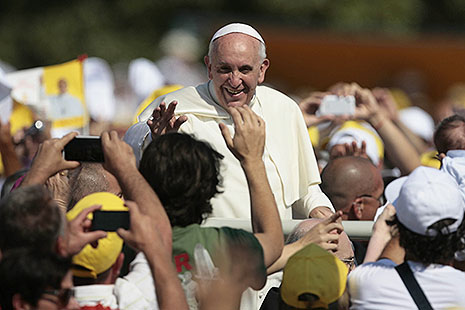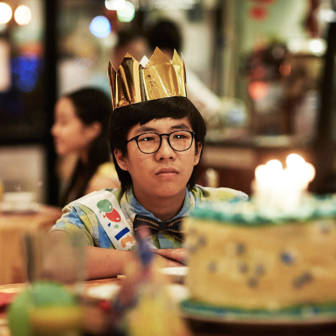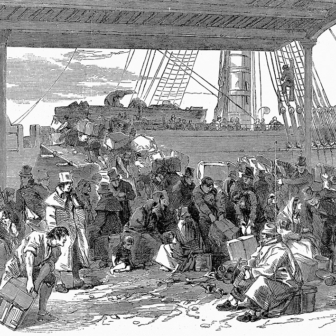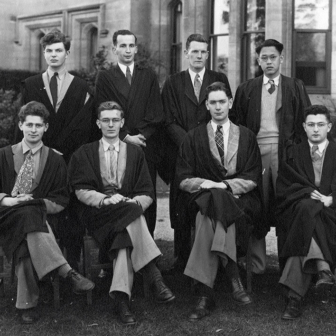JUST over a year ago, in the hope that the government and the opposition would endorse a bipartisan response to the arrival of asylum seekers, independent MP Rob Oakeshott introduced the Migration Legislation Amendment (The Bali Process) Bill into federal parliament. The debate in both houses was emotionally charged, with tears shed for people who had drowned while trying to reach Australia by boat. But government and opposition could not agree on the best means of deterring asylum seekers from embarking on the dangerous voyage from Indonesia, and the bill failed. Soon after, Julia Gillard appointed a three-man panel of experts to advise her on how to stop the boat arrivals. Following their recommendations, the government reintroduced the offshore processing of asylum seekers on Nauru and in Papua New Guinea, and established a “no advantage” rule whereby asylum seekers found to be refugees must wait for as long as they would in the imaginary queue until they are resettled by Australia.
Despite those harsh measures, the number of asylum seekers arriving by boat increased. So far this year, more than 15,000 “boat people” have arrived in Australian waters or been intercepted by Australian customs or navy vessels – almost as many as during all of 2012. Since offshore processing began, possibly hundreds of people have drowned in the attempt to reach Australia by boat, including nine on 12 July, after their vessel sank near Christmas Island, and another four on 16 July, after a boat capsized while it was being escorted by Australian customs vessels.
These deaths in Australian waters prompted calls for yet-tougher deterrence measures. Last Friday, Australia’s biggest-selling paper, the Melbourne Herald Sun, depicted eleven small children on its front page under the headline “Save Boat Babies.” That same day, prime minister Kevin Rudd announced a new policy: any asylum seekers arriving by boat would be processed in Papua New Guinea. Those found to be refugees in the terms of the 1951 Refugee Convention would then be resettled in Papua New Guinea.
Would the Herald Sun’s “boat babies” be better off in a country like Afghanistan, where the lives of members of ethnic and religious minorities are not safe? Or in Indonesia, where many asylum seekers, including children, are detained under appalling conditions in Australian-funded camps? Or on Papua New Guinea’s Manus Island, where “the living conditions for all asylum seekers [are] harsh,” according to a new report from the United Nations High Commissioner for Refugees, and “the remoteness of the location, the nature of the facility (on a naval base) and the difficult living conditions appear to contribute to the all-pervasive sense of frustration and despondency which, if left unresolved for a protracted period, is likely to lead to increased levels of psycho-social and physical harm of those affected”?
On the day of the announcement, reflecting the prevailing view among refugee advocates, Greens leader Christine Milne argued that Kevin Rudd had “leapfrogged Tony Abbott on cruelty.” The government would hardly contest this claim. The new policy is meant to be cruel – in fact, cruel enough to be a successful deterrent. It is also unjust and unworkable, as the box below shows.
Kevin Rudd prides himself on being compassionate, and tries to reassure Australians that compassion is one of their attributes as a nation. In this respect he resembles prime minister John Howard at the time of the Tampa crisis. In late August 2001, while the Tampa and its cargo of 438 “boat people” was in waters near Christmas Island, Howard told Fran Kelly, “We are a decent, generous, compassionate humanitarian country, but we also have an absolute right to decide who comes to this country.” On Friday, prime minister Rudd insisted that “we are a compassionate nation and we will continue to deliver a strong humanitarian program.”
In drawing attention to the hypocrisy of Australian prime ministers, I am not trying to suggest that genuine compassion ought to dominate Australia’s response to asylum seekers, nor that a truly compassionate response would be a viable long-term answer to forced migration. As I have argued in Inside Story, in some circumstances compassion may allow us to recognise suffering in the first place and motivate us to address it, but in the end Australia’s response ought to be guided by its responsibilities as a regional power, its capacity to accommodate refugees, and its recognition that those approaching by boat have rights according to international legal principles and that Australia has obligations arising from those same principles.
The trouble with the dominant conversation about “boat people” is not that Australian politicians and other public commentators don’t feel for people who are languishing in refugee camps or detention centres, or who are embarking on dangerous journeys to countries that seem to offer the prospect of a new life. Rather than the absence of compassion, it’s a surfeit of fear and anger that is the problem. Canberra’s politicians may not be afraid of “boat people” as such, but they do nothing to assuage the fears and anger of the electorate. Both the opposition and the government either take these fears for granted, or they stoke them in the expectation that heightened anxieties will deliver them electoral gains.
GIVEN that the outpouring of compassion – unlike the granting of rights – presupposes an unequal relationship between the one who is compassionate and the one who is shown compassion, it is perhaps just as well that the compassion invoked by Kevin Rudd and others is fake. But many of those pontificating about the “problem” of asylum seekers are not just lacking compassion. They are indifferent. The policy initiatives of the current Labor government are informed, on the one hand, by self-interest – it wants to win the forthcoming election, or at least not lose in a landslide – and, on the other, by indifference about the people at whom their initiatives are directed.
Sure, Australia’s politicians don’t want to see yet another asylum seeker boat sink in Australian waters. They don’t want another asylum seeker to die trying to reach Christmas Island, Ashmore Reef or the coast of Western Australia. To give Kevin Rudd and his colleagues the benefit of the doubt: they may be genuinely troubled by the fact that “boat people” have perished trying to reach Australia, rather than merely by the sight of them drowning in front of their and other Australians’ eyes. They may be particularly concerned about the death of women and children. But for the government, it has become almost irrelevant who is arriving by boat and why they are paying people smugglers to bring them to Australia while knowing full well the risks involved.
On Friday, Kevin Rudd impressed on the Australian public his credentials as a diplomat. He had talked to the UN secretary-general and to Indonesia’s president, and then fronted the cameras with Papua New Guinea’s prime minister to announce an agreement the two men had reached. His predecessor, by contrast, hadn’t tried to pose as a diplomat, but rather as an Australian Joan of Arc. Very soon after her successful coup in June 2010, Gillard let herself be photographed on board HMAS Broome, one of the ships that patrol Australia’s borders; it was obvious that that’s how she liked Australians to see her.
Both Rudd, the perennial diplomat, and Gillard, the defender of the nation’s borders, talked endlessly about asylum seekers, but neither prime minister ever talked to them. The idea of an Australian prime minister visiting a detention centre or greeting so-called irregular maritime arrivals on the wharf at Christmas Island’s Flying Fish Cove may seem far-fetched.
But sometimes it is useful to remember that not everything taken for granted in Australia is universally considered self-evident. Or, as one reader mused when commenting on an article reporting Friday’s policy announcements in Le Monde: “Ils sont étranges ces Australiens, étrangers au Monde.” (They are strange those Australians, strangers to the world.) In fact, as two alternative responses to irregular migrants make clear, the approach taken by Kevin Rudd, and others of his predecessors, is anything but self-evident.
SOMEBODY who has been preoccupied by the problem of irregular migration and to whom the idea of talking to “boat people” would not have appeared strange is the Pope. On 8 July, in what was one his first forays out of Rome, Pope Francis visited Lampedusa, an Italian island that lies some 110 kilometres north of the Tunisian coast. Lampedusa is the principal destination of thousands of predominantly African irregular migrants who are trying to enter the European Union. The Pope insisted that he be accompanied by only one politician, namely the local mayor. After his arrival he boarded a ship of the Italian coast guard to throw flowers into the sea in remembrance of the thousands of people who have drowned in the Mediterranean in recent years, including more than 1500 in 2011 alone. He then said mass on the island.
In his homily, Francis exhorted his listeners to be sensitive to the suffering of others. He said what one might expect the Pope to say: he invoked God’s questions to Adam, “Where are you?,” and to Cain, “Where is your brother?,” and talked about the parable of the Good Samaritan. At one point, he mentioned compassion, lamenting that our society had forgotten how to experience it. But two other terms appeared far more often in his homily: “solidarity” and “indifference.”
According to Francis, migrants such as those landing on Lampedusa fail to find understanding, acceptance and solidarity. Unlike compassion, I’d suggest that solidarity is not reserved for the deserving. Unlike compassion, solidarity does not presuppose a power differential between the person who suffers and the one who alleviates her suffering. It is not a gift that places the burden of an unrepayable debt on the recipient. Twice in his homily, Francis singled out the Lampedusani, the islanders of Lampedusa, for offering their solidarity. Lampedusani – and Christmas Islanders, for that matter – have had a conflicted relationship with irregular migrants. As Olly Lambert’s brilliant 2011 BBC documentary, The Invasion of Lampedusa, shows, Lampedusani are unlikely Good Samaritans; in fact, many of them deeply resent the fact that their island has become a first port of call for tens of thousands of African irregular migrants. Nevertheless, over the years they have been remarkably welcoming and have on occasion offered solidarity to those arriving on their shores – irrespective of whether these arrivals were refugees in the terms of the 1951 Refugee Convention. (Most of them, in fact, were not.)
Most importantly, Pope Francis condemned what he called “la globalizzazione dell’indifferenza,” the globalisation of indifference. According to Francis, indifference is the result of an empty illusion, a soap bubble, which is created by our “cultura del benessere,” a culture that privileges material comfort and a sense of contentedness. Trying to take this argument out of the theological context in which it is couched, we could say that this cultura del benessere not only encourages indifference; it also promotes the kind of benevolent generosity that is expressed in terms of compassion.
Other statements by the new Pope suggest that he considers the cultura del benessere a key flaw of twenty-first-century Western society. But it would be too easy to think of the indifference he spoke about on Lampedusa as a weasel word invoked in the services of a distinctly evangelical cultural critique, for Francis was clear about what should replace indifference: not compassion, as one could have expected given the role played by it in the Church’s teaching, but rather attentiveness. “We are no longer attentive to the world we inhabit,” he said, and provided an example of the kind of attentiveness required. Before he had come to Lampedusa, he explained, he had listened “to one of those brothers of ours,” an irregular migrant. Whether it was a result of that man’s story, or a result of making himself knowledgeable about the people who cross from the African coast by boat, his homily made two references to irregular migrants as agents: they were “journeying towards a better future,” he said, and they were “looking for a means to sustain their families.”
After celebrating mass, Francis met with a select fifty “boat people.” The newspapers did not report exactly what Pope Francis said during that meeting. I would like to imagine that the Pope was curious about those he met – that once more he himself was anything but indifferent to their stories. One of the migrants read out a joint letter, in halting Arabic, in which he explained that they had left their homelands for political and economic reasons, and that they had survived a dangerous journey.
I OWE my second example to Rob Walker’s remarkable BBC radio documentary, The Man Who Fell to Earth, which was recently broadcast on ABC Radio National. The documentary follows the investigation into the death of a man who in September 2012 fell out of the sky and onto a suburban road in Mortlake, a suburb of southwest London. Walker interviewed local residents who had seen the body lying in the street, along with the coroner, a mortuary technician, a pathologist and the police officer in charge of the case. The dead man was evidently from sub-Saharan Africa but did not carry any identification. His face had suffered horrendous injuries on impact. He did, however, have a mobile phone, two SIM cards and some Angolan currency in his pocket.
The local residents recalled that they were not surprised. As one told Walker, “When I saw the body and the way it was lying, the immediate thought was, he had fallen out of a plane… because previously there had been instances in this area where stowaways had fallen out of planes.” “We are in a flight path,” another added by way of an explanation. It was, indeed, not the first time that a man had fallen from the undercarriage of a plane on its approach to Heathrow. The police quickly established that a British Airways flight from Luanda, Angola, had been passing overhead at the time of the death.
“So the question,” Rob Walker says on the program, “was why he took this extraordinary risk, and who he was.” In the Australian context, such questions are not self-evident. None of the journalists reporting the death of the “boat people” on 12 and 16 July, and none of the politicians commenting on them, asked who they were and why they had made the journey to Australia. But Walker was not the only one asking those questions. “What must have been going through his mind to do that,” one of the residents wondered, “I would really like to know why he did it.” “What makes people take such big risks to get out of their country?” asked another of the residents who had seen the shattered body lying in the street.
To establish the man’s identity, the police began by asking a technician to reconstruct the man’s face. They then provided a photo of the reconstruction, together with the man’s DNA and dental records, to the Angolan authorities – without any success. But they were able to unlock one of the dead man’s SIM cards. It led them to a mobile number in Switzerland, which belonged to a woman who had lived in South Africa two years earlier. She identified the man as a Mozambican national whom her family had employed as a gardener. She was also able to describe him: his personality, his appearance, and his personal interests. “It was lovely to have him around,” she told Walker. She and the man had been very close – “he was like my family.” Upon her return to Europe, she tried to sponsor him for a visa, but he had no prospects of getting one through regular means, and therefore tried to use money she sent him to obtain false papers. After a corrupt Mozambican official disappeared with all his money, the man travelled to Angola, from where he’d heard it was easier to get to Europe. When he arrived in Luanda, his Swiss friend was not able to send him more money, and that’s where, in Rob Walker’s words, “the trail went cold.”
The coroner who heard the case had dealt with “five or six” stowaways falling from planes. For her, these cases were upsetting because “you feel they had such high hopes of finding a different life here” and because “you just don’t know what the background is.” Like the police, she was determined to find out as much about the man as possible. She told Walker: “We owe it to the family, who we may someday discover, that we ask all the right questions now.” In this case, the family has not yet been found, but given that everybody involved in the case was attentive to the world they inhabit, it will be possible to provide answers should the opportunity arise.
What is remarkable about the story is the interest shown in the dead man – by the documentary maker, the coroner, the pathologist, the people living in the street where he was found and, most significantly, the police officer in charge of the case. They kept asking who he was, where he came from, and why he risked his life by stowing away in a plane’s wheel-well.
Attentiveness of this kind doesn’t automatically lead to answers. After all, the Metropolitan Police were never able to establish the circumstances under which the man found lying in a suburban London street climbed into a Boeing’s wheel housing at Luanda Airport. But attentiveness has the potential to add to our understanding of the world.
The policy changes announced by Kevin Rudd on Friday are informed by a thorough understanding of the Australian electorate’s voting behaviour, but I doubt that they are informed by a similarly thorough understanding of the complex issues of forced migration in the Asia-Pacific region. In fact, in my view, the frequent references to the purported drivers of forced migration, the profiteers once labelled by Rudd “the vilest form of human life,” demonstrate that the issues’ complexity has been conveniently reduced to a tableau peopled by heroes, villains and victims. Friday’s policy changes may rely on assumptions about what asylum seekers holed up in Indonesia will or will not do, but they are not informed by an understanding of why millions have left their homes in Afghanistan, Sri Lanka or Iran in the first place.
“Attentiveness to the world we inhabit” could mean listening to the Hazara man who paid a people smuggler to take him to Australia. But it could also mean paying closer attention to what we, living in the affluent West, think and do. It could mean detecting the self-interest inherent in our compassion for the sufferer, or being critically aware of the indifference that comes with our cultura del benessere. •
Why Australia’s decision to send asylum seekers to Papua New Guinea is wrongThe measures announced by Kevin Rudd last Friday can be criticised on at least eight grounds.
First, Australia is dealing with only a tiny fraction of the world’s displaced people, and is now shirking its responsibilities under the Refugee Convention by off-loading asylum seekers to an impoverished neighbouring country.
Second, there is no guarantee that Papua New Guinea will be able either to process or to resettle a large number of people who have – in terms of their culture, language, ethnicity and religion – little in common with Papua New Guineans. The country – which is currently ranked 156, 154 places below Australia, on the UNDP Human Development Index – does not have the resources required for such a task. Nor does it have the requisite experience. It is politically unstable, and therefore unlikely to provide a long-term solution. Even in the short term, the agreement signed by PNG prime minister Peter O’Neill may not gain the political support in Papua New Guinea that is needed to implement it. According to ABC journalist Sean Dorney, whose knowledge of Australia’s northern neighbour is second to none, a lot of communities in Papua New Guinea will be asking, “Well, what about us?”
Third, by taking on some of Australia’s asylum seekers, Papua New Guinea would add to its own longstanding refugee problem: thousands of refugees from West Papua, who fled to Papua New Guinea in the 1980s. Earlier this year, the United Nations High Commissioner for Refugees reached an agreement with PNG that makes these people the sole responsibility of the PNG authorities – after a period of twenty-eight years, during which the High Commissioner had been responsible for their welfare. According to a recent United Nations report, despite the length of their stay in Papua New Guinea, the vast majority of these West Papuans have not been able to become citizens, and some still have no work rights and no full access to services. Although they – unlike the “boat people” Australia is now sending – come from similar cultures as Papua New Guineans, for many of them a durable solution has not yet been found. Papua New Guineans who are being asked to come to the aid of their affluent southern neighbour may also recall that Australia has not once offered to resettle refugees from West Papua who sought asylum in Papua New Guinea.
Fourth, asylum seekers who are deterred from coming to Australia may try their luck elsewhere. Australia’s new policy may close one route, but it doesn’t stop people from following routes at least as dangerous as the boat journey from Indonesia to Christmas Island. (As I reported last month in Inside Story, some New Zealanders are concerned that “boat people” would try to reach their country rather than Australia; they needn’t be concerned: boats that are barely seaworthy enough to make the 500-kilometre trip from Java to Christmas Island are unlikely to keep going until they get to New Zealand.)
Fifth, Papua New Guinea is exacting a high price – which, if the Nauruan experience is any indication, will only keep going up. As the Nauruan example also suggests, the injection of very large amounts of money into Papua New Guinea’s economy will not necessarily benefit ordinary Papua New Guineans; thus the argument that the deal with Australia will lead to the improvement of health and education services in the country as a whole is shaky.
Sixth, Australia’s reputation, particularly in the region, will suffer, not least because it will be accused of breaching its international legal obligations and its responsibilities as one of the wealthiest nations on the planet.
Seventh, the government’s response will encourage Australians to think that they have every right and reason to be concerned about the arrival of “boat people”; by panicking in response to what is objectively and comparatively a manageable problem, the government condones pettiness and xenophobia, and paranoia about Australia’s purported vulnerability to invasion.
Finally, judging by the experience of the past twelve months, the policy may not have the result it purportedly is trying to achieve: namely to stop the flow of “boat people.” (I have, however, little doubt that the policy will meet its principal objective: the neutralisation of the asylum seeker issue until after the forthcoming election.) •
— Klaus Neumann




